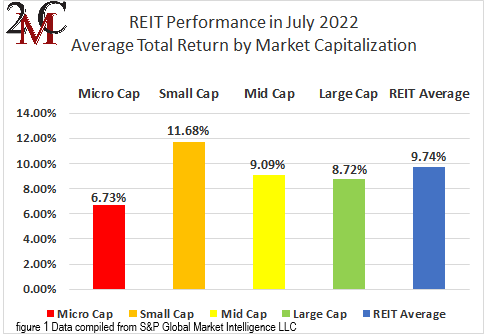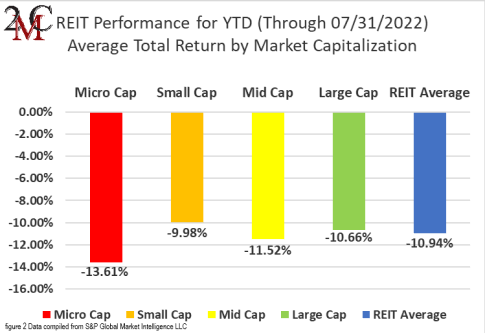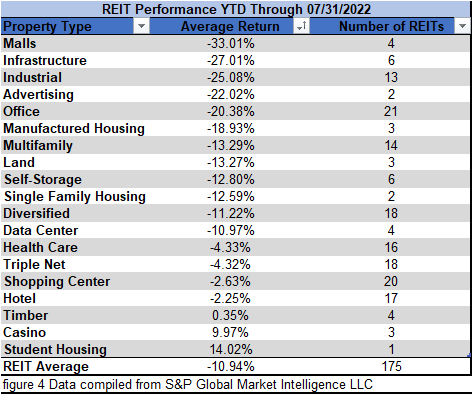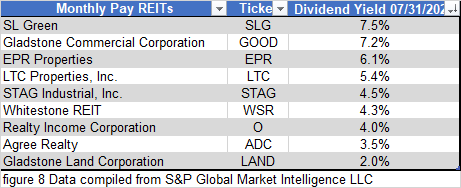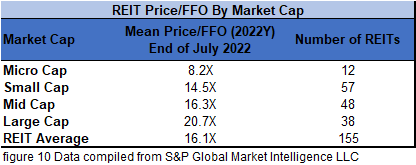The State of REITs: August 2022 Edition
- The REIT sector has achieved gains in only 2 of the first 7 months of 2022, including a +9.74% total return in July.
- Small cap (+11.68%) and mid cap (+9.09%) REITs had the greatest total returns, while large caps (+8.72%) and micro caps (+6.73%) saw more modest gains in July.
- A remarkable 91.72% of REIT securities had a positive total return in July.
- Malls (+32.83%) and Triple Net REITs (+17.03%) led all property types in July. Student Housing (+1.32%) and Data Center (+2.91%) REITs underperformed.
- The average REIT NAV discount narrowed from -22.15% to -15.24% during July. The median NAV discount also narrowed from -21.32% to -12.67%.
REIT Performance
The REIT sector trimmed 2022 losses with a very strong July rebound as REITs averaged a +9.74% total return. REITs outperformed the Dow Jones Industrial Average (+6.8%) and the S&P 500 (+9.2%) in July but were outpaced by the NASDAQ (+12.4%). The market cap-weighted Vanguard Real Estate ETF (VNQ) saw smaller gains than the average REIT in July (+8.62% vs. +9.74%) and remains deeper in the red YTD (-13.69% vs. -10.94%). The spread between the 2022 FFO multiples of large cap REITs (20.7x) and small cap REITs (14.5x) widened in July as multiples increased by 1.3 turns for large caps and only 0.1 turns for small caps. In this monthly publication, I will provide REIT data on numerous metrics to help readers identify which property types and individual securities currently offer the best opportunities to achieve their investment goals.
19 out of 19 Property Types Yielded Positive Total Returns in July
100 percent of REIT property types averaged a positive total return in July, with a 31.51% total return spread between the best and worst performing property types. Student Housing (+1.32%) and Data Center (+2.91%) REITs had the worst average total returns in July as every single REIT property type was in the black.
Mall (+32.83%) and Triple Net (+17.03%) REITs led all property types in July as the REIT sector and broader market rebounded from a brutal first half of 2022. Pennsylvania REIT (PEI) (+62.69%) was the top performer among the Malls in July, followed by strong performances from CBL Properties (CBL) (+32.35%), Macerich (MAC) (+21.81%), and Simon Property Group (SPG) (+14.45%).
Performance of Individual Securities
PS Business Parks (PSB) was acquired on July 20th by Blackstone (BX) for $187.50/share in an all-cash deal, continuing Blackstone’s REIT acquisition spree.
Healthcare Trust of America (HTA) merged with Healthcare Realty Trust (HR) on July 20th to form the largest pure-play medical office REIT. HTA shareholders received shares of HR in a 1-for-1 exchange as well as a $4.82/share special dividend. The combined entity retained the Healthcare Realty Trust name and trades under the ticker symbol HR.
Seritage Growth Properties (SRG) (+130.71%) soared on the July 7th filing of preliminary proxy materials in which the board of trustees unanimously recommended that shareholders vote to approve a proposed plan of sale of all SRG assets, distribution of all net proceeds to shareholders and dissolution of the company. This conclusion of a review of strategic alternatives that was previously announced in March 2022 was very well received by shareholders, more than doubling the share price by the end of July. However, despite the remarkable share price performance in July, SRG is still down -9.42% in 2022.
New York City REIT (NYC) (-28.95%) announced the suspension of its dividend on July 1st in order to retain enough capital to fund tenant improvements and leasing commissions. Continued poor fundamental performance coupled with dividend suspension sent the struggling REIT deeper into negative territory. NYC is now the 3rd worst performing REIT in 2022 with a -64.22% total return.
91.72% of REITs had a positive return in July, but only 24.57% are in the black year to date. During the first seven months of last year, the average REIT had a +27.38% return, whereas this year the average REIT has seen a -10.94% total return.
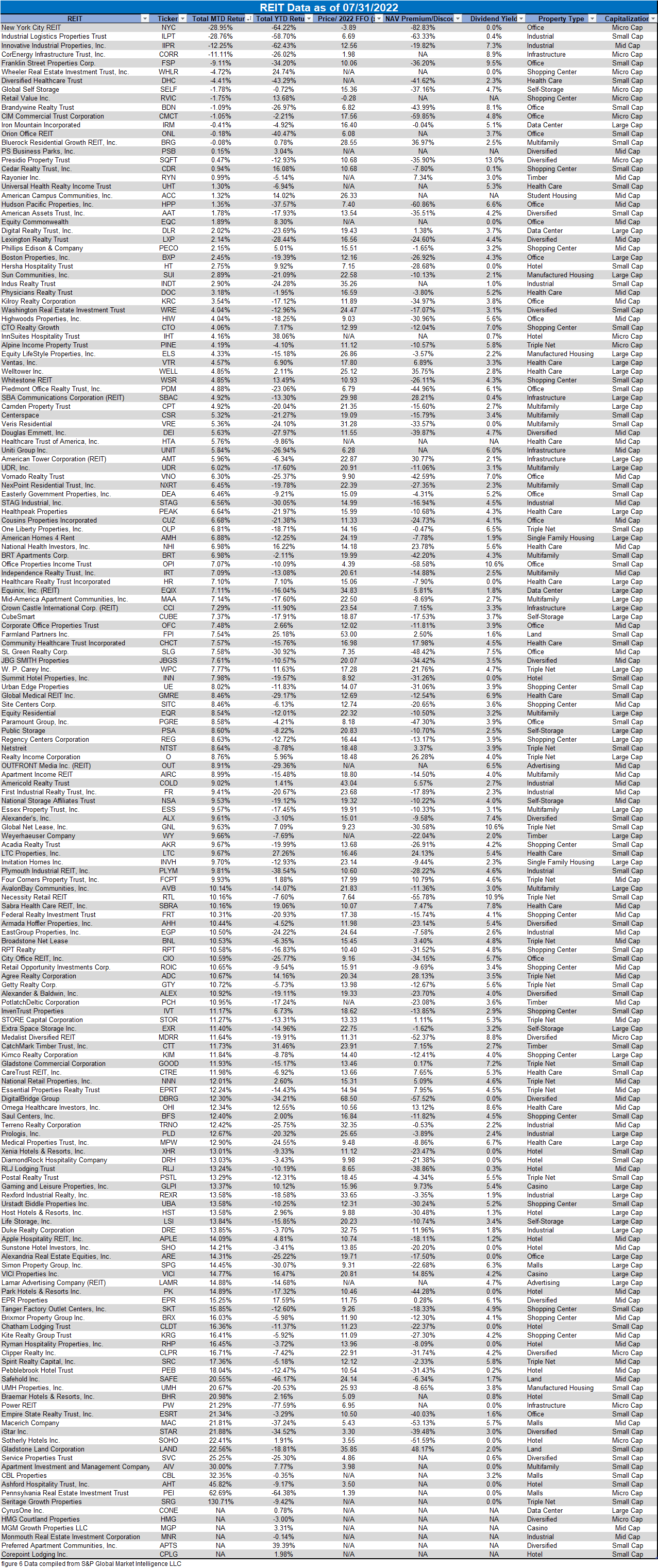
Dividend Yield
Dividend yield is an important component of a REIT’s total return. The particularly high dividend yields of the REIT sector are, for many investors, the primary reason for investment in this sector. As many REITs are currently trading at share prices well below their NAV, yields are currently quite high for many REITs within the sector. Although a particularly high yield for a REIT may sometimes reflect a disproportionately high risk, there exist opportunities in some cases to capitalize on dividend yields that are sufficiently attractive to justify the underlying risks of the investment. I have included below a table ranking equity REITs from highest dividend yield (as of 07/31/2022) to lowest dividend yield.

Although a REIT’s decision regarding whether to pay a quarterly dividend or a monthly dividend does not reflect on the quality of the company’s fundamentals or operations, a monthly dividend allows for a smoother cash flow to the investor. Below is a list of equity REITs that pay monthly dividends ranked from highest yield to lowest yield.
REIT Premium/Discount to NAV by Property Type
Below is a downloadable data table, which ranks REITs within each property type from the largest discount to the largest premium to NAV. The consensus NAV used for this table is the average of analyst NAV estimates for each REIT. Both the NAV and the share price will change over time, so I will continue to include this table in upcoming issues of The State of REITs with updated consensus NAV estimates for each REIT for which such an estimate is available.

Takeaway
The large cap REIT premium (relative to small cap REITs) widened in July and investors are now paying on average about 43% more for each dollar of 2022 FFO/share to buy large cap REITs than small cap REITs (20.7x/14.5x – 1 = 42.8%). As can be seen in the table below, there is presently a strong positive correlation between market cap and FFO multiple.
The table below shows the average premium/discount of REITs of each market cap bucket. This data, much like the data for price/FFO, shows a strong, positive correlation between market cap and Price/NAV. The average large cap REIT (-3.04%) trades at a single-digit discount to NAV, while mid cap REITs (-15.33%) and small cap REITs (-19.69%) trade at double-digit discounts. Micro caps on average trade at less than 3/5 of their respective NAVs (-45.25%).
The vast majority of REITs pay a common dividend and many also have preferred shares that pay dividends as well. The yields on these dividends vary greatly from as low as 0.1% from Cedar Realty Trust (CDR) to as high as double digits for REITs such as Presidio Property Trust (SQFT) and Global Net Lease (GNL). Some REITs temporarily suspended their dividends during the government-imposed lockdowns of 2020 and the resulting market crash, but then re-instated their dividends when financial markets started to stabilize. However, there are other REITs such as Wheeler REIT (WHLR) and Ashford Hospitality Trust (AHT) that suspended their common dividends years ago and have yet to reinstate them.
Although 2020 saw a significant number of dividend cuts, we have seen far fewer since the end of 2020. In addition to the 4 equity REITs that cut their common dividends in 2021, Industrial Logistics Properties Trust (ILPT) announced the first REIT dividend cut of 2022 on July 14th. ILPT slashed the dividend by an enormous 97% reduction.
In addition to the inflation hedge provided by real estate due to rising asset values and rapidly increasing tenant rents, they can also be a great source of dividend growth. 5 of the 7 REITs that hiked their dividends in July had already raised their dividends at least once already earlier this year. Based on the strength of Q2 REIT earnings, we will likely see many more dividend hikes within the REIT sector before the end of the year.
Important Notes and Disclosure
All articles are published and provided as an information source for investors capable of making their own investment decisions. None of the information offered should be construed to be advice or a recommendation that any particular security, portfolio of securities, transaction, or investment strategy is suitable for any specific person. The information offered is impersonal and not tailored to the investment needs of any specific person.
We cannot determine whether the content of any article or recommendation is appropriate for any specific person. Readers should contact their financial professional to discuss the suitability of any of the strategies or holdings before implementation in their portfolio. Research and information are provided for informational purposes only and are not intended for trading purposes. NEVER make an investment decision based solely on the information provided in our articles.
We may hold, purchase, or sell positions in securities mentioned in our articles and will not disclose this information to subscribers, nor the time the positions in the securities were acquired. We may liquidate shares in profiled companies at any time without notice. We may also take positions inconsistent with the information and views expressed on our website.
We routinely own and trade the same securities purchased or sold for advisory clients of 2MCAC. This circumstance is communicated to our clients on an ongoing basis. As fiduciaries, we prioritize our clients’ interests above those of our corporate and personal accounts to avoid conflict and adverse selection in trading these commonly held interests.
Past performance does not guarantee future results. Investing in publicly held securities is speculative and involves risk, including the possible loss of principal. Historical returns should not be used as the primary basis for investment decisions. Although the statements of fact and data in this report have been obtained from sources believed to be reliable, 2MCAC does not guarantee their accuracy and assumes no liability or responsibility for any omissions/errors
Commentary may contain forward-looking statements that are by definition uncertain. Actual results may differ materially from our forecasts or estimations, and 2MCAC and its affiliates cannot be held liable for the use of and reliance upon the opinions, estimates, forecasts, and findings in this article.
Through October 2021, The State of REITs was published exclusively on Seeking Alpha by Simon Bowler, Sector Analyst at 2nd Market Capital Services Corporation (2MCSC). Editions subsequent to October 2021 will be published on this website in addition to other platforms that may include Seeking Alpha. 2MCSC was formed in 1989 and provides investment research and consulting services to the financial services industry and the financial media. 2MCSC does not provide investment advice. 2MCSC is a separate entity but related under common ownership to 2nd Market Capital Advisory (2MCAC), a Wisconsin registered investment advisor. Simon Bowler is an investment advisor representative of 2MCAC. Any positive comments made by others should not be construed as an endorsement of the author's abilities to act as an investment advisor.
S&P disclosure: S&P Global Market Intelligence LLC. Contains copyrighted material distributed under license from S&P.

